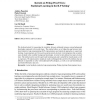Free Online Productivity Tools
i2Speak
i2Symbol
i2OCR
iTex2Img
iWeb2Print
iWeb2Shot
i2Type
iPdf2Split
iPdf2Merge
i2Bopomofo
i2Arabic
i2Style
i2Image
i2PDF
iLatex2Rtf
Sci2ools
110
click to vote
JMLR
2006
2006
Kernels on Prolog Proof Trees: Statistical Learning in the ILP Setting
We develop kernels for measuring the similarity between relational instances using background knowledge expressed in first-order logic. The method allows us to bridge the gap between traditional inductive logic programming (ILP) representations and statistical approaches to supervised learning. Logic programs are first used to generate proofs of given visitor programs that use predicates declared in the available background knowledge. A kernel is then defined over pairs of proof trees. The method can be used for supervised learning tasks and is suitable for classification as well as regression. We report positive empirical results on Bongard-like and M-of-N problems that are difficult or impossible to solve with traditional ILP techniques, as well as on real bioinformatics and chemoinformatics data sets.
| Added | 13 Dec 2010 |
| Updated | 13 Dec 2010 |
| Type | Journal |
| Year | 2006 |
| Where | JMLR |
| Authors | Andrea Passerini, Paolo Frasconi, Luc De Raedt |
Comments (0)

